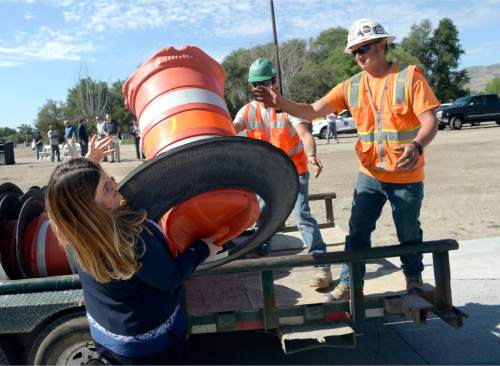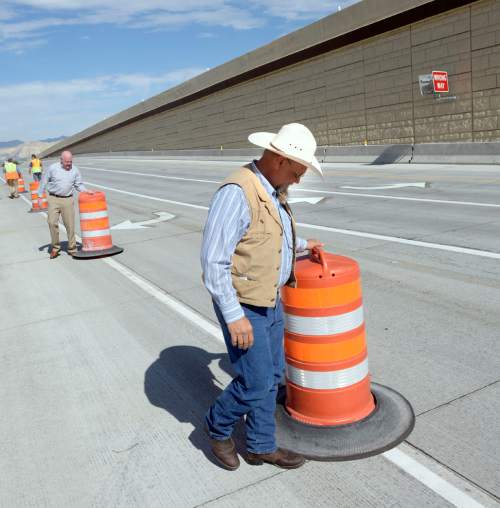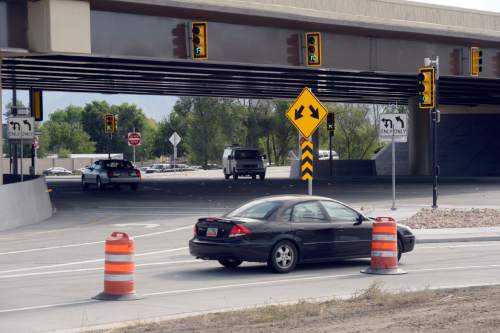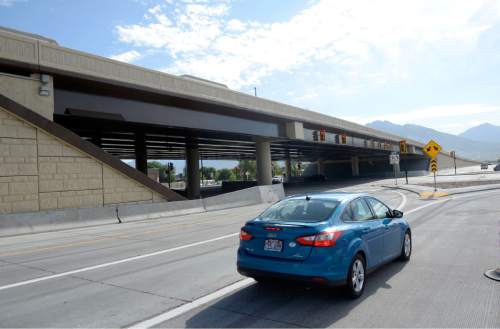This is an archived article that was published on sltrib.com in 2015, and information in the article may be outdated. It is provided only for personal research purposes and may not be reprinted.
Highway and water projects in Utah soon may face much tougher fights for state funding, while social services and other programs may find more money headed their way.
After a year of study, an advisory group of tax experts is recommending the Legislature eliminate a series of earmarks on sales-tax revenues that have automatically set aside huge pots of money for road and water projects.
"So they would have to compete with other programs for their funding" if legislators approve that recommendation, said Curtis Trader, chairman of the Utah Tax Review Commission.
Such earmarks provided $461 million this year for state highway and transportation work — gobbling up about 20 percent of all state sales-tax money — and $32.3 million went toward water and agriculture programs.
The Legislature reactivated the Tax Review Commission to study the issue in light of the large sums of sales-tax revenue involved. Commission members include legislators from both parties; the chairman of the Utah Tax Commission; bankers; and tax lawyers and accountants, including Trader, who heads the panel.
The group agreed unanimously that 15 of the 16 current state sales-tax earmarks be eliminated beginning July 1, the start of the state's next fiscal year. Some believe the other one should go, too.
The commission also unanimously recommended that future use of earmarks in general be greatly curtailed.
Trader said the commission's conclusions reflect concerns that because these set-asides provide automatic funding without competition, the transportation and water projects they pay for may not receive as much oversight as other state programs.
"They tend to get lost in the process because their funding is automatic," Trader said. "It's not an indictment on these programs themselves. But without that review and that oversight, things have the potential to go awry very quickly.
"Not having oversight on a particular issue or on how tax monies are being spent," he added, "is a distasteful way of administering the resources of the state."
Billy Hesterman, vice president of the nonprofit Utah Taxpayers Association, praised the panel's recommendations, saying they will improve the state's budgeting process.
"Earmarks tie the hands of legislators in making a budget," Hesterman said. "Taking away these earmarks will now let us react to the needs of the citizens," so lawmakers "can move the money to where it needs to go."
Steve Erickson, a lobbyist for Crossroads Urban Center, which serves the poor, hopes legislators adopt a recommendation to eliminate one earmark setting aside 30 percent of all new growth in state sales tax for highway projects.
"That takes a huge bite out of social-service programs, and the potential for Medicaid expansion," Erickson said. "Those are critical issues for the people we represent.
"That doesn't mean that we're not going to build roads or that we're not going to pay off bonds [for road projects]," he added. "It means that we're going to have to do this in the normal budget process rather than setting these earmarks aside as untouchable and as of the highest priority."
Rep. Joel Briscoe, D-Salt Lake City and a commission member, emphasized that voting against earmarks does not mean that he or others are opposed to the transportation and water projects they fund.
"It means we're opposed to a funding mechanism," Briscoe said, "that doesn't provide a regular review of merit and efficacy."
State agencies helped by the earmarks say such funding assisted in protecting essential operations and projects.
For example, Shane Marshall, deputy director of the Utah Department of Transportation, urged in testimony before the commission that earmarks be retained to guarantee funding to pay off bonds for recent highway projects — and to keep future projects on schedule.
But he said UDOT also favors gradually reducing its earmarked share of sales taxes from the current 20 percent to 17 percent, matching the share of sales taxes drawn from automobile-related sales. Marshall said it made sense to steer that money to roads.
The commission did not go along with that suggestion, but a majority did agree with another request from Marshall and UDOT. They asked that an earmark — worth about $32 million a year — be kept because it was the result of an earlier political compromise.
When the state agreed to send cities and counties a larger share of the state gasoline tax, it also gave UDOT the earmark to make up for the money it lost in that deal.
John Valentine, a tax-review commission member who also leads the Utah Tax Commission, pushed to retain the earmark. As president of the Utah Senate when that compromise was made, Valentine said eliminating it could force a complicated reworking of formulas to split gasoline taxes.
Other earmarks under review include:
• Giving 30 percent of growth in sales-tax revenue to projects designed to expand highway capacity. Gov. Gary Herbert vetoed that set-aside when it passed in 2011, but the Legislature overrode him. The earmark provided $126 million this year.
• Four approved through the years that provide money to the Transportation Investment Fund for projects to expand and maintain highway capacity. Those earmarks provided a total of $292 million this year.
• Two earmarks for transportation projects on top of the ones that boost road capacity. One provided $11 million this year to address "choke points" on roads, and another supplied $32 million for other state highway costs.
• Four earmarks that provided $28.2 million this year for water programs. They include funding for projects for water supply, wastewater and loans to farmers and ranchers for range management.
• Five small earmarks, totaling $4.1 million, that go to the Department of Natural Resources. Those include programs to protect sensitive plant and animal species, cloud-seeding and watershed rehabilitation or restoration.
Trader is scheduled to present the commission's recommendations Nov. 18 to the Legislature's Taxation and Revenue Interim Committee.
ldavidson@sltrib.com Twitter: @LeeHDavidson









